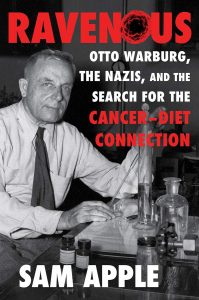Between You and Me: What causes cancer? Otto Warburg and the Nazis wanted to know
By Leah S. Dunaief

There are two good stories in “Ravenous: Otto Warburg, the Nazis, and the search for the Cancer-Diet Connection.” The newly released book, by Sam Apple, is about the Nazi’s hunt for the cause of cancer and the remarkable support Hitler gave, before and during World War II, to Otto Warburg, a premier scientist, homosexual and Jew.
Hitler’s mother, possibly the only person he loved, died a painful death from breast cancer. Hitler, reportedly a vegetarian and a hypochondriac, periodically thought he was dying of cancer. Otto Warburg, who won the Nobel Prize in 1931 and had been nominated repeatedly for the prize during his career, did in-depth biochemical research on the metabolism of tumors, especially cancer cells. Despite Warburg’s several obvious drawbacks and outspoken criticism of Nazi values — he refused to have Nazi flags in his lab or offer the Nazi salute — Hitler protected him and allowed him to do his work.
Otto Heinrich Warburg, born in 1883 into a prominent family of bankers and scientists, first distinguished himself in the elite cavalry regiment, the Uhlans, during WWI. He won the Iron Cross for bravery and was still fighting at the front in 1918 when Albert Einstein, a close friend of his physicist father, wrote him a letter urging him to come home. Einstein told him that science needed him. That, combined with his breakthrough research before the war on sea urchins, and his aristocratic family, did much to solidify his lifetime arrogance.

He did return home, continued his distinguished work, and was named director of a Kaiser Wilhelm Institute in Berlin founded by the Rockefeller Foundation, designed by him in the Rococo style, in 1931. He proceeded with his investigations into the causes of cancer, which had been relatively rare until the 19th century but was exploding in numbers in the early 20th century. The German people, along with people in the United States and elsewhere, were terrified of the disease.
Warburg’s hypothesis was that cancer growth was caused by tumor cells generating energy (to reproduce) mainly by the anaerobic (no oxygen) fermentation of glucose. Healthy cells, by contrast, generate energy mainly from oxidative breakdown with the salt pyruvate in the mitochondria (part of the cell responsible for producing the cell’s energy.) If you don’t understand those last sentences, it doesn’t matter. The point is that Warburg believed the primary cause of cancer was the replacement of the respiration of oxygen in normal body cells with the fermentation of sugar. Therefore the culprit: SUGAR.
Today the understanding of the cause of cancer is mutations in oncogenes and tumor suppressor genes that lead to a malignant transformation. The metabolic changes in cells that Warburg observed were not causative, today’s scientists believe, but the result of those mutations.
Warburg’s work offered support for the role of metabolism in the mitochondria in aiding tumor suppression. He oversimplified the complex interactions between the mitochondria and the cell nucleus, between metabolism and mutations.
After the war, Warburg did come to the United States, but his self-important personality, his tyrannical behavior in the lab, his imperiousness with his peers and finally his inability to admit error, all helped to push his research out of sight. He ultimately returned to Switzerland.
In the 1960s, scientific attention turned to the newly defined DNA and cancer-causing genes. Only with the new century has there been a metabolism revival and attention to the role of insulin and the link with obesity.
The book offers us interesting history, both about the Nazis and scientific research into the causes of cancer. Reading it will certainly make us think about what we eat.







